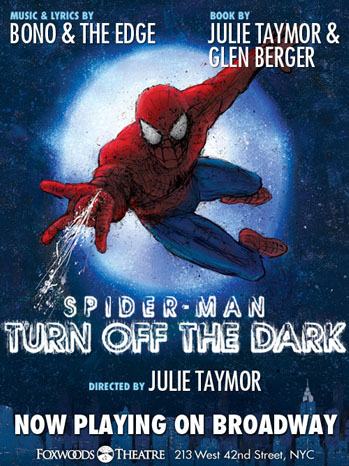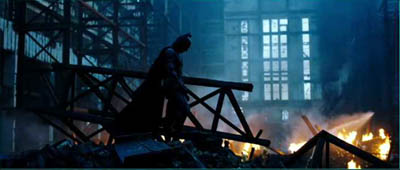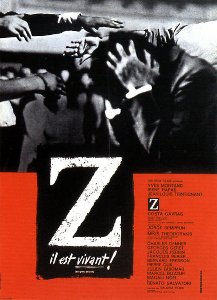Spider-Man and the Second Coming of Ronald Reagan
I'm not planning on making this site overtly political, but I'll make an exception this time. A friend brought to my attention this article from The Hollywood Reporter, wherein everyone's favorite paranoid television personality, Glenn Beck, delivers glowing praise to Spider-Man: Turn Off the Dark, and praises its wholesome "conservative" message:
Similar to conservative tea-partiers, the show disparages atheism, the idea of manmade global warming, overreaching government officials and a clueless and corrupt media, Beck said.
The article also provides a link to a list of the "Best Conservative Movies," according to The National Review. This list includes such films as The Dark Knight, 300, Forrest Gump, Master and Commander, and Team America: World Police. Each film is also accompanied by a short blurb from a pundit or blogger about why it's on the list.
 300, for instance is a valiant depiction of hardy men making a stand for freedom, and the sacrifice necessary to defend it. [ref] Never mind that Sparta, with its mandatory military service and enthusiastic slavery, was a model for future Fascist governments. [/ref] The Lion, The Witch, and the Wardrobe has its Christian allegory. [ref] So does Harry Potter, and no, he was not playing on Satan's team. [/ref] And Team America... well, I think Mr. Brian C. Anderson was completely missing the point.
300, for instance is a valiant depiction of hardy men making a stand for freedom, and the sacrifice necessary to defend it. [ref] Never mind that Sparta, with its mandatory military service and enthusiastic slavery, was a model for future Fascist governments. [/ref] The Lion, The Witch, and the Wardrobe has its Christian allegory. [ref] So does Harry Potter, and no, he was not playing on Satan's team. [/ref] And Team America... well, I think Mr. Brian C. Anderson was completely missing the point.
So I don't think these conservative interpretations [ref] Or "readings," to use the Academic term [/ref] hold much water. For one thing, I can't get a good sense of what this "conservative" philosophy values. Even with all of the blurbs written by different people, you'd think their ideas would be more uniform. In some films, like 300, Braveheart, and The Lives of Others, freedom and liberty are championed, but in The Dark Knight and Master and Commander[ref] In the 20-installment series of novels on which it is based, there is lots of material to give social conservatives cause for concern: The two main characters, Captain Jack Aubrey, and his best friend, naturalist/surgeon/spy Stephen Maturin, are a serial womanizer and an opium addict, respectively. In the movie, even, Matruin comes dangerously close to discovering natural selection in the Galapagos. [/ref], the power of authority (superhero or government) to protect people is most important.
And then there are others that are contradicted by the films they're referencing: Forrest Gump is a model citizen compared to his girlfriend, Jenny, a hippie drug user who has sex out of wedlock. Yet this ignores the scene where Forrest collects a crowd of followers on one of his cross-country jogs. When he decides to stop, the multitudes become upset. Forrest is confused- Why do they think he has all the answers to the mystery of life? He doesn't!
Okay, it's fun to pick on stupid remarks from Glenn and stupid lists like this, but it got me thinking. These movies aren't explicitly "conservative," whatever that means, and neither is Spider-Man. It all sounds like zeitgeist talk, where media analysts explain a movie's popularity by claiming that it taps into some collective unconsciousness. Or rather, when a movie becomes popular, everyone tries to explain how it validates their worldview.
David Bordwell talks about dubious zeitgeists here [ref] If you're lazy, scroll down til you see Batman. [/ref]. He points out, as I have above, that interpretations of the zeitgeist are often contradictory. The New York Times wrote an editorial on The Dark Knight, and couldn't find a coherent message at all. DB says this is deliberate: If Hollywood offends half its audience with a political message, that's bad business. Hence, a hippie watches Patton, and sees the "hero as an egotistical nutcase," while a veteran thinks it's a "tribute to a great warrior."
interpretations of the zeitgeist are often contradictory. The New York Times wrote an editorial on The Dark Knight, and couldn't find a coherent message at all. DB says this is deliberate: If Hollywood offends half its audience with a political message, that's bad business. Hence, a hippie watches Patton, and sees the "hero as an egotistical nutcase," while a veteran thinks it's a "tribute to a great warrior."
Do any of these interpretations change my opinion of the films they talk about? Not really... I disliked 300's visual style and its Fascistic macho posturing already. Many of the other films on the list I liked for many reasons. Often, the conservative reading would have never occurred to me. These films are not changing anybody's mind about anything. They're vaguely topical, but don't have any substantive commentary.
 If you're looking for a film with a real, bold opinion about a controversial issue, check out D.W. Griffith's silent masterpiece, Birth of a Nation. I hope you have the courage to follow our innocent Southern belle's example and hurl yourself off a cliff if you are ever pursued by a man in blackface. Don't worry, the Ku Klux Klan shall avenge you.
If you're looking for a film with a real, bold opinion about a controversial issue, check out D.W. Griffith's silent masterpiece, Birth of a Nation. I hope you have the courage to follow our innocent Southern belle's example and hurl yourself off a cliff if you are ever pursued by a man in blackface. Don't worry, the Ku Klux Klan shall avenge you.
But if you aren't looking for a racist, revisionist history lesson [ref] Griffith was so embarrassed by the response to Birth of a Nation, he followed it with his other silent masterpiece, called Intolerance. [/ref], try Z. Director Costa Gavras made Z (1969) while in exile in France, after a military coup had taken over his native Greece. A political thriller about the conspiracy and cover up of a politician's assassination, it opens with one of the most badass legal disclaimers in cinema history:
Any resemblance to real events, to persons living or dead, is not accidental. It is DELIBERATE.
Political themes can make movies exciting and current, but I'm always wary of people claiming a movie says something, or reflects how everybody feels. Unless it's explicit, it probably isn't really there. Blockbusters are also poor platforms to evangelize politics- given their massive audience, they have to appeal to many different people. Audiences tend to receive emotional messages from movies, rather than intellectual ones [ref] You don't walk out of the theater with a soundbite or a slogan in your head. [/ref]. If you want to change how people think [ref] And who doesn't? [/ref], go for the heart, not the head.
